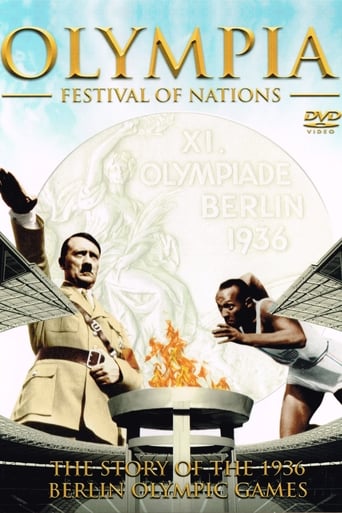Horst in Translation ([email protected])
This is "Olympia 1. Teil - Fest der Völker", a German film from 80 years ago. The runtime stated here on IMDb is 2 hours 1 minute, but the version I watched was roughly 115 minutes long "only". The writer and director here is centenarian Leni Riefenstahl. At this point in her career, she had already stopped acting and produced some of the most infamous propaganda films in history. However, this documentary here is nothing like that. Like the title says, it is a celebration of all peoples. I personally felt it started a bit uninteresting, but when the introduction was over and the action moved to the actual event, the 11th Olympic Games from 1936 in Berlin, it gets a really great watch. For me, it was fun to see not only the athletes, but check their names on Google while watching and see what happened to them after the Games, during the war for example. I must say it is a bit disappointing how there is not such a documentary for all Olympic Games these days. The film is fairly neutral. It does show the German victories, but also shows for example the triumphs of African American athlete Jesse Owens, the biggest winner from the 1936 games probably. The documentary starts with the opening ceremony (not counting the prologue) and ends with the closing ceremony that follows the marathon event won by a Japanese athlete. Of course, we do not see Hitler applaud the foreign athletes, especially not the Black ones like Owens, but this would also have been really surprising. Germany wanted to prove themselves as open to the world (of sports), but that would have been too much. I believe this was a very good watch and all the original footage makes it a priceless historic document in terms of sports and politics. The only criticisms I could think of while watching was the lack of sports that weren't athletics, but I see Riefenstahl apparently covered that area in her second film on the subject. A must-see for every aspiring sports journalist. Highly recommended.
l_rawjalaurence
OLYMPIA was split into two parts for its German release, but amalgamated into one elsewhere. I saw the amalgamated version, in which the principal focus of attention centered on the athletics. Riefenstahl's photography is quite outstanding; her sense of camera placement impeccable; her ability to define the individual in relationship to environment cannot be questioned. As a study in the human body and its potential, OLYMPIA cannot be faulted. However there is perhaps less to OLYMPIA than meets the eye: viewers looking to the film as a source of Nazi propaganda are likely to be disappointed. True, there are shots of Adolf Hitler clapping approvingly at German athletes winning gold medals; and shots of the swastika being raised during various ceremonies; but the film in this version adopts an even-handed approach to its material. The only suggestion of politics comes when the British and American athletes refuse to adopt the Nazi salute, both during the opening ceremony and during medal ceremonies; rather they salute as they might have done if they were acknowledging superior officers in the Army. As a record of a unique event, OLYMPIA cannot be faulted, but perhaps it should be treated first and foremost as a sports documentary rather than a piece of political propaganda.
Discern
One of my fondest hopes is that the present-day cinema community has, perhaps, finally become more enlightened by moving beyond its past need to so ignorantly and personally denigrate Ms. Riefenstahl for her "past political sins". For those who have made this important step in maturity, her film "Olympia" may be viewed on its ARTISTIC merit - the finest example of both direction and cinematography ever seen in a documentary. Her pace of action, camera angles, use of scan/sweep, etc. set the standards for modern excellence using the crude technological tools of 1936. Even the most hardened and indifferent sports "fan" cannot fail to be impressed by her consummate skills. For those of a more political bent, I must agree that the film makes a most definite propaganda statement by glorifying a particular ethnicity. However, this glorification is NOT of the German Nazi party, but of the American BLACK ATHLETE. Jesse Owens, Ralph Metcalfe, Mack Robinson, Archie Williams, John Woodruff, Cornelius Johnson, and David Albritton are the unquestionable "stars of the show" as they make literal mincemeat of all their so-called Arian competition. The most touching scene is, after the completion of the long jump competition, when Jesse Owens (American Gold Medalist) and Luz Long (German Silver Medalist) walk arm-in-arm as they begin what later turned into a 24-carat friendship. However, for those of you who continue to "never let the data interfere with your theory" - you have my condolences.
gbheron
I must admit I don't get it. Reviewers and commenters lavish praise on the brilliant cinematography employed by Ms. Reifenstahl in filming the 1936 Olympics. She is supposed to have poured years of her life into her two-part documentary (this film is part one). Nowadays the NFL puts out weekly and yearly highlight films, and the only difference I see is that one is black and white, the other in colour. For me this is standard documentary, and that's all. My recommendation is that if you do not consider yourself a highbrow film connoisseur or are not interested in the 1936 Olympics this movie may bore you.



